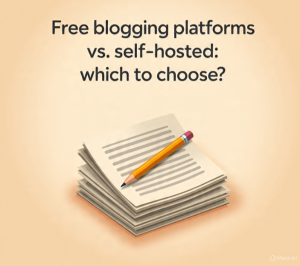Free Blogging Platforms vs. Self-Hosted: Which to Choose?

Choosing where to publish a blog is a turning point: it shapes your freedom to monetize, your SEO potential, how much time you spend on tech, and — ultimately — whether you can scale the site into a business. Below is a thorough, no-fluff guide that compares free/hosted blogging platforms (WordPress.com, Blogger, Medium, Substack, Wix, Squarespace, etc.) with self-hosted setups (WordPress.org, Ghost, custom CMS). It gives actionable steps, a cost and AdSense-readiness checklist, and a clear recommendation path so you can decide and act — not wonder.
—
Quick TL;DR (pick this if you’re busy)
Choose a free/hosted platform if you want zero-maintenance, fast setup, and don’t plan to run programmatic ads (AdSense) immediately. Great for hobbyists, writers testing ideas, or newsletters that sell subscriptions.
Choose self-hosted if you want full control over SEO, design, plugins, advanced monetization (AdSense, affiliate networks, programmatic ads), scalability, or to build a site that’s a long-term asset.
AdSense note: Google requires you to own and control your site and meet policy/quality standards before approving — this favors self-hosted setups or hosted services that let you add your own domain and code.
—
What we mean by “Free/Hosted” vs “Self-Hosted”

Free/Hosted platforms (what they are)
Services where the platform hosts everything for you and often provide an easy editor and built-in features. Examples:
WordPress.com (hosted WordPress), Blogger (Google), Medium, Substack, Wix, Squarespace.
They range from fully free (with subdomain and platform ads) to paid tiers that unlock more features.
Self-hosted (what that means)
You register a domain, rent web hosting, and install a CMS (WordPress.org, Ghost, Drupal). You control the server, install any plugin, modify templates, run your own analytics, and upload code.
Self-hosted = more responsibility, but also more control and more paths to monetize.
—
How each option stacks up (detailed, actionable comparison)
1) Ownership & control
Free/hosted: Platform owns the environment. You often get a subdomain (yourname.platform.com) and limited access to the code or server settings. Even when you pay, some platforms restrict plugin installation or custom code. For example, WordPress.com requires a Business plan to install third-party plugins.
Self-hosted: You fully own the site and can add code, modify server settings, install plugins, or migrate anytime.
Actionable takeaway: If your future plan includes custom integrations, advanced analytics, or selling/placing your own ads — choose self-hosted.
2) Monetization (AdSense, affiliates, sponsorships)
Free/hosted: Monetization rules vary. Medium and Substack favor subscription models and limit or block third-party ad code. Wix and others allow AdSense only if you have a paid plan and custom domain; Blogger integrates easily with AdSense because it’s Google-owned.
Self-hosted: You can run AdSense, header bidding, affiliate networks, custom ad placements, and any programmatic solution — so long as you comply with policies (content quality, privacy, CMPs in EU, etc.).
Actionable takeaway: For AdSense or multiple ad networks (highest revenue flexibility), pick self-hosted. If you want no-friction subscription income and none or limited ads, some hosted platforms are fine.
3) SEO & Discoverability
Free/hosted: Basic SEO features are usually built in. However, deeper technical SEO (schema, sitemap control, advanced canonical handling, server tweaks for speed, custom redirects) is sometimes restricted. Subdomains (platform.com/yourname) may be treated as separate entities by search engines — which can complicate domain authority.
Self-hosted: Full control: SEO plugins (Yoast, Rank Math), schema plugins, server-level caching, CDNs, image optimization, and fine control over URL structure and canonicalization. This matters for competitive niches.
Actionable takeaway: If your goal is to rank in competitive queries or build topical authority, self-hosted wins.
4) Cost & Scalability
Free/hosted: May be free to begin but often forces upgrades for monetization features or to remove platform branding. Paid tiers can be cheaper initially but scale costs as traffic & features grow.
Self-hosted: Startup costs: domain ($10–$20/yr), hosting (shared $3–$10/mo; managed WordPress $20+/mo; VPS/cloud $5–100+/mo depending on scale). Long term, you pay for hosting, premium themes/plugins, backups, and possibly developer time. Domain price ranges are consistent across registrars.
Actionable takeaway: For cheapest short-term option: hosted. For best long-term ROI (control + monetization), self-hosted is typically more cost-effective.
5) Design & Customization
Free/hosted: Good templates and drag-and-drop builders (Wix, Squarespace). But full theme/plugin customization is often gated behind higher tiers or prohibited.
Self-hosted: Unlimited themes, child themes, custom CSS, JS, APIs, server-side features.
Actionable takeaway: For custom branding and conversion optimization, self-hosted is superior.
6) Maintenance & security
Free/hosted: Platform manages updates, backups, and security. Lower day-to-day effort, but you’re dependent on the platform’s timeline for fixes.
Self-hosted: You’re responsible for updates, security hardening, backup strategy, SSL, and CDN. Managed WordPress hosts can remove much of this burden, but at higher cost.
Actionable takeaway: If you don’t want to manage tech, pick hosted or choose managed hosting for self-hosted.
—
Platform by platform: short practical notes
WordPress.com
Fast to publish; paid plans unlock monetization and plugin installation (Business/Commerce tiers). WordAds is available under specific conditions. For full plugin control and AdSense freedom, self-hosted is better.
Blogger
Free, Google-owned, and integrates easily with AdSense; good for simple blogs. Limited modern features and templates.
Medium
Great traffic potential and a built-in audience via the Medium Partner Program, but you cannot run AdSense; you’re constrained to Medium’s monetization.
Substack
Newsletter-first; excellent for subscription revenue and sponsorships. Not built for programmatic ad networks like AdSense.
Wix / Squarespace
Drag-and-drop builders; you can use AdSense on paid plans with custom domain. Good for non-technical users who sell products or services but less flexible for enterprise-level customizations.
Self-hosted WordPress (WordPress.org)
The most common self-hosted choice: unlimited plugins, SEO control, full monetization, and robust community support. Best for blogs that become businesses.
—
AdSense: realistic approval checklist (must-follow)
Google is selective. These items are essential if your end goal is to run AdSense ads (or other programmatic ads):
1. You must be 18+ and have full control of the site. (owner/admin access, ability to add AdSense code).
2. Use a top-level domain (yoursite.com) — subdomains or platform URLs often block AdSense verification unless the platform supports hosted AdSense.
3. Essential trust pages: About, Contact, Privacy Policy (must reference cookies/ad networks), Terms of Service.
4. Quality & original content: 20–50 high-quality posts (long-form useful content beats short thin posts). Avoid scraped or auto-generated content.
5. Clear navigation & no abusive experiences: No forced downloads, deceptive popups, or malware.
6. Site speed & mobile friendly: Use caching, responsive design, and images compressed.
7. Cookie/consent compliance for EU/UK: If you serve EU/EEA/UK, implement a Google-certified CMP per recent requirements.
Actionable checklist you can follow today:
Register domain, buy hosting (see recommended hosts below), install WordPress, install SEO + schema plugins, add trust pages, publish 20 well-researched posts, add analytics and Search Console, apply for AdSense.
—
Costs — realistic starter budget (2025 market ranges)
Domain: $10–$20 / year (common TLDs).
Shared hosting (starter): $3–$10 / month. Good for hobby sites and early blogs.
Managed WordPress hosting: $20–$60 / month (better performance, backups, WP support). Good for business sites.
VPS / cloud (scalable): $5–$80+/month depending on CPU/RAM and traffic.
Premium theme / professional design: $50–$300 (one-time).
Essential premium plugins (cache, security, backups): $0–$200/year (depends).
Initial content & marketing budget: variable (time is currency; consider $200–$1,500 for outsourced content).
Actionable tip: For AdSense readiness and fast site performance, a managed WordPress plan (entry level) often removes many friction points — but you can start on cheap shared hosting and upgrade later.
—
Recommended hosts & quick notes (tested picks for 2025)
If you’re going self-hosted, consider these categories (pick one based on budget and skill):
Budget, beginner-friendly: Hostinger, Bluehost — cheap entry plans, simple UI.
Mid-range, flexible: Cloudways (managed cloud), SiteGround — strong performance and scale.
Premium managed WP: WP Engine, Kinsta — best uptime, automated backups, staging, curated plugin lists; higher price but less technical work.
Actionable pick: If you expect to monetize quickly and want low friction, start with a respected managed WordPress host’s entry plan; it buys time while you produce content.
—
How to set up a self-hosted WordPress blog that’s AdSense-ready (step-by-step, actionable)
1. Buy domain + hosting
Choose a host (managed if you prefer little sysadmin). Buy yourdomain.com. (Domain cost $10–$20/yr).
2. Install WordPress (one-click with most hosts).
3. Install these core plugins (minimum):
SEO: Rank Math or Yoast.
Caching: Use host’s built-in or WP Rocket/Cache plugin.
Backups: UpdraftPlus or host backup service.
Security: Wordfence or Sucuri.
Schema/structured data: Rank Math or dedicated schema plugin (see recommendations).
4. Create trust & policy pages: About, Contact, Privacy Policy (include ad & cookie text), Terms.
5. Design: Responsive theme (mobile first), set logo, basic conversion elements (email capture).
6. Write: 20–50 cornerstone posts — long-form, original, solve real user problems. Use internal linking.
7. Speed & mobile: Use CDN, compress images, lazy load, and run a Lighthouse test.
8. Analytics & Search Console: Submit XML sitemap.
9. Cookie consent (if EU/EEA/UK visitors): Install a Google-certified CMP as required.
10. Apply to AdSense only when the site is stable and has enough content (and you can add the verification code). Remember: Google checks content quality and user experience.
—
Common myths (busted)
Myth: “Hosted = better SEO.”
Truth: SEO depends on content quality, site structure, and technical performance. Self-hosted gives you the tools to optimize those things; hosted platforms can limit them.
Myth: “You need thousands of visitors to qualify for AdSense.”
Truth: There’s no hard traffic threshold stated by Google — quality and policy compliance matter most. Many sites are approved with modest traffic if content and layout meet policies.
Myth: “Free platforms are illegal for AdSense.”
Truth: Some hosted platforms allow AdSense if you use a custom domain and paid plan (e.g., Wix), while others (Medium, Substack) push subscription models. Check each platform’s rules.
—
Which to choose? Decision flow (practical)
1. I want to test ideas quickly and avoid tech: Start on Medium or a free WordPress.com/Wix trial. But if you plan to scale or add ads later, prefer self-hosted from day one.
2. I want to build a long-term monetized asset (AdSense, affiliates, product sales): Self-hosted WordPress.
3. I want subscriptions/newsletters and direct relationship with readers: Substack or a WordPress + paid newsletter plugin.
4. I want no maintenance + visual site builder (ecommerce or portfolio): Wix/Squarespace (with paid plan).
—
AdSense-Ready Checklist (copy/paste into your project tracker)
[ ] Domain registered (TLD), hosting ready.
[ ] WordPress (self-hosted) installed OR site on paid hosted plan that allows custom ad code.
[ ] About / Contact / Privacy / Terms pages live.
[ ] 20+ high-quality, unique posts (800–2,500 words where relevant).
[ ] Schema & sitemap in place; Search Console connected.
[ ] Cookie consent solution for EU/EEA/UK (Google-certified CMP where required).
[ ] Site passes mobile and performance checks (Lighthouse).
[ ] No policy-violating content (copyright, adult, malware, deceptive behaviour).
—
Final recommendation (practical, no-nonsense)
If your priority is long-term revenue, full monetization options (including AdSense), SEO control, and having a transferable digital asset, go self-hosted WordPress on a reputable host (managed WordPress if you want to avoid sysadmin).
If you just want to publish, test topics, or build a newsletter audience quickly with minimal technical work, pick a hosted platform — but plan to migrate to self-hosted when the blog starts earning or needs advanced features.
Top-priority next steps (pick one):
Ready to commit long-term? I recommend: buy a domain, get a managed WordPress plan (entry tier), and follow the AdSense checklist above.
Not ready to commit? Start on Medium or WordPress.com free plan to validate, then migrate once you have repeatable traffic or product ideas.
—
Want help? — Action call (choose one)
Pick one and I’ll produce it for you right now (no waiting):
1. A free 30-day AdSense readiness plan tailored to your niche (content calendar, 20 post outlines, keyword targets).
2. A technical quick-start for self-hosting: recommended host + exact plugin list + copy-paste privacy/cookie text and AdSense verification steps.
3. A fast blog audit: paste your site URL and I’ll evaluate AdSense readiness, SEO gaps, and a prioritized fix list.
Send help me to support@financialliteracy.com.ng with “Option 1”, “Option 2”, or “Option 3” (or tell me your preferred option) and I’ll generate everything you need immediately — starting with real, step-by-step instructions you can follow to kickstart your blogging journey.
—
Sources & further reading (selected, authoritative)
Google AdSense — Eligibility & Program Policies. https://support.google.com/adsense/answer/9724?hl=en
WordPress.com monetization & plan features (WordAds info). https://wordpress.com/support/wordads-and-earn/
Wix — Monetize with AdSense app and AdSense integration. https://www.wix.com/app-market/web-solution/google-adsense
Self-hosted WordPress advantages for SEO and performance. https://www.searchenginepeople.com/blog/why-self-hosted-wordpress-is-still-the-best-cms-for-seo-speed-and-user-experience.html
Best managed WordPress hosting (buyer’s guides & reviews, 2025). https://www.bluehost.com/wordpress/wordpress-hosting
Domain pricing and registration (Namecheap guide). https://www.namecheap.com/domains/
Learn More About: https://blogging.financialliteracy.com.ng/blogging-vs-vlogging-vs-podcasting-which-is-better/
Frequently Asked Questions
1. What is the difference between free blogging platforms and self-hosted blogs?
Free blogging platforms (like WordPress.com, Blogger, or Medium) host everything for you and may limit customization and monetization. Self-hosted blogs (like WordPress.org) require your own hosting and domain but give you full control, flexibility, and more monetization options.
2. Can I use Google AdSense on free blogging platforms?
Some free platforms allow AdSense only if you upgrade to a paid plan and connect a custom domain (e.g., Wix, Blogger). Others (like Medium and Substack) don’t allow AdSense at all. For maximum control and approval chances, self-hosted blogs are recommended.
3. Is self-hosting expensive for beginners?
Not necessarily. A domain name usually costs $10–$20 per year, and shared hosting starts at around $3–$10 per month. Many bloggers start small and upgrade as traffic grows.
4. Which is better for SEO: free blogging platforms or self-hosted blogs?
Self-hosted blogs give you full control over SEO through plugins, schema markup, and server optimization. Free platforms may have basic SEO features but often limit technical adjustments needed to rank in competitive niches.
5. Do I need technical skills to run a self-hosted blog?
Basic skills help, but most hosts offer one-click WordPress installs. Managed WordPress hosting also handles updates, backups, and security, so you can focus on writing and growing your blog.
6. Which option is better for making money blogging?
Self-hosted blogs are better for monetization because you can run Google AdSense, affiliate links, sponsored content, and even sell digital products. Free platforms usually restrict or control monetization methods.
7. Can I start on a free platform and switch to self-hosted later?
Yes, migration is possible (e.g., from WordPress.com to WordPress.org or from Blogger to WordPress). However, starting self-hosted from the beginning saves time and avoids SEO complications.
